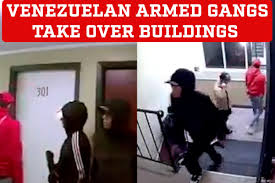Venezuelan Gangs: An In-Depth Look at Their Rise, Impact, and Implications
Venezuelan Gangs: An In-Depth Look at Their Rise, Impact, and Implications

In recent years, Venezuela has faced an array of challenges, from economic collapse to political instability. Amidst these crises, a particularly troubling phenomenon has emerged: the rise of gangs that wield significant power and influence in the country. These gangs have transformed from localized criminal organizations into major players in Venezuela’s socio-political landscape, profoundly affecting the nation’s security and stability.
The Rise of Gangs in Venezuela
The origins of gang violence in Venezuela can be traced back to a combination of socio-economic factors, including extreme poverty, unemployment, and the collapse of state institutions. The economic downturn, exacerbated by political turmoil and international sanctions, has led to widespread disenfranchisement, creating fertile ground for gang recruitment and expansion.
Initially, gangs in Venezuela were localized, focusing on petty crimes and neighborhood-level disputes. However, as the country’s situation deteriorated, these gangs began to grow in size and influence. Their evolution can be attributed to several factors:
1. Economic Hardship: The severe economic crisis has led to a rise in poverty and unemployment, which gangs exploit by offering financial incentives and a sense of belonging to vulnerable individuals. This economic desperation has provided a steady stream of recruits.
2. Political Instability: The ongoing political crisis, marked by power struggles and government corruption, has weakened the state’s ability to enforce the rule of law. This power vacuum has allowed gangs to operate with increasing impunity.
3. Drug Trafficking: Venezuela’s strategic location between South America’s drug-producing regions and the Caribbean has made it a key transit point for drug trafficking. Gangs have increasingly become involved in the drug trade, further boosting their power and resources.
Prominent Gangs and Their Activities
Several prominent gangs have emerged in Venezuela, each with its own territory, power base, and areas of influence. Some of the most notable include:
1. Los Rastrojos: Originating from Colombia, Los Rastrojos have extended their operations into Venezuela. Known for their involvement in drug trafficking and organized crime, they have established a strong presence in border regions and urban centers.
2. La Cota 905: This gang operates primarily in Caracas, the capital city. Known for its violent tactics and involvement in armed robberies, extortion, and drug trafficking, La Cota 905 has become a symbol of the extreme violence plaguing Venezuelan cities.
3. El Tren de Aragua: Originally from the Aragua state, this gang has grown into one of the most powerful criminal organizations in Venezuela. El Tren de Aragua is involved in a wide range of criminal activities, including drug trafficking, human trafficking, and extortion.
These gangs exert significant control over their territories, often engaging in violent confrontations with rival gangs and law enforcement. Their activities have led to a surge in violent crime, including homicides and kidnappings, further exacerbating the country’s security crisis.
Impact on Venezuelan Society
The proliferation of gangs has had profound effects on Venezuelan society, contributing to a range of social, economic, and political issues:
1. Escalating Violence: The presence of gangs has led to a dramatic increase in violent crime. Caracas, in particular, has become one of the most dangerous cities in the world, with gang-related violence contributing to high homicide rates and frequent armed confrontations.
2. Erosion of Public Services: Gangs often control neighborhoods and dictate terms to local residents. This control extends to public services, with gangs sometimes taking over functions such as garbage collection or security. This undermines the ability of the state to provide essential services and exacerbates social instability.
3. Displacement and Migration: The violence and insecurity driven by gangs have contributed to the displacement of millions of Venezuelans. Many people have been forced to flee their homes due to gang violence, adding to the already significant migrant crisis in the region.
4. Weakening of State Institutions: The growing power of gangs has further weakened already fragile state institutions. Corruption and the inability of law enforcement to combat gang activities have diminished trust in governmental bodies and hindered efforts to address the country’s broader crises.
Government Response and Challenges
The Venezuelan government has struggled to effectively address the growing influence of gangs. Efforts to combat gang violence and restore order have faced numerous challenges:
1. Limited Resources: The economic crisis has strained the government’s resources, leaving law enforcement agencies underfunded and poorly equipped. This has hampered their ability to effectively combat gang activities.
2. Corruption: Corruption within law enforcement and government institutions has further undermined efforts to address gang violence. In some cases, gangs have reportedly bribed officials or forged alliances with corrupt elements within the government.
3. Human Rights Concerns: Efforts to crack down on gangs have sometimes resulted in human rights abuses. There have been reports of extrajudicial killings and other forms of violence committed by security forces, which complicates the situation and contributes to public mistrust.
4. Political Considerations: The political context in Venezuela, characterized by deep polarization and conflict, has affected the effectiveness of responses to gang violence. The focus on political struggles has sometimes overshadowed efforts to address the underlying causes of gang proliferation.
Regional and International Implications
The rise of gangs in Venezuela has broader regional and international implications:
1. Regional Security: The instability in Venezuela has repercussions for neighboring countries. The influx of Venezuelan migrants and the spread of gang violence have impacted regional security and contributed to social and economic strains in neighboring nations.
2. Drug Trafficking: Venezuela’s role as a transit point for drug trafficking has global implications. The involvement of gangs in the drug trade affects international drug markets and raises concerns about the spread of organized crime beyond Venezuela’s borders.
3. International Response: The international community has been grappling with how to address the Venezuelan crisis, including the rise of gangs. Humanitarian aid, support for regional stability, and diplomatic efforts are part of a broader response to the crisis.
Conclusion
The rise of gangs in Venezuela represents a significant and troubling development in the country’s ongoing crisis. Driven by economic hardship, political instability, and involvement in drug trafficking, these gangs have become powerful actors in Venezuelan society, contributing to violence, instability, and the erosion of state institutions.
Addressing the gang crisis requires a multifaceted approach that includes not only efforts to combat violence but also strategies to address the underlying socio-economic issues. Strengthening state institutions, combating corruption, and enhancing regional cooperation are essential components of a comprehensive response.
As Venezuela continues to navigate its complex challenges, the international community’s engagement and support will be crucial in helping the country address the impact of gang violence and work towards a more stable and secure future.



